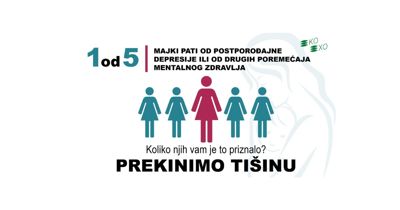
Postpartum depression is the most common health complication after childbirth, and according to global and local research, it affects one in five women. However, more than 50% of women are never diagnosed or receive adequate support, which can have long-term consequences for both them and their families. This serious issue was the focus of a panel discussion organized last week by the EKO EHO Association - Center for Education and Promotion of Healthy Living, as part of the campaign "Advocating for the Introduction of Postpartum Depression Screening in Bosnia and Herzegovina."
The panel featured experts and individuals with personal experience of postpartum depression, discussing the symptoms, consequences, and the importance of early detection and support. The panelists were Aleksandra Marinković, a graduate psychologist and psychotherapist in training, Svjetlana Kutić, a mother with personal experience of postpartum depression, and Dr. Mladen Šukalo, a specialist in family medicine and head of the Health Promotion and Disease Prevention Center at the Public Health Institute of Banja Luka.
"We would like to express special gratitude to Svjetlana for bravely deciding to publicly share her experience and struggle with postpartum depression, all with the aim of helping other women who are going through the same. As she herself said, she will be satisfied if her story helps at least one woman feel that she is not alone and that postpartum depression is temporary and treatable", stated the Association.
The participants of the discussion emphasized that untreated postpartum depression can lead to serious consequences, including long-term psychological and physical issues for the mother, as well as developmental problems for the child. The crucial role of healthcare institutions and medical staff in the early recognition of symptoms and providing adequate support was also highlighted.
"The EKO EHO Association will continue to advocate for the improvement of systemic support and the provision of adequate care for the mental health of mothers, pregnant women, and new mothers in Bosnia and Herzegovina, so that postpartum depression screening becomes a regular part of healthcare for pregnant women and mothers", said Jelena Mihić Salapura, campaign coordinator. The panel concluded with an appeal for postpartum depression screening to be introduced as a standard practice in healthcare institutions in Bosnia and Herzegovina, in order to timely recognize and treat mental health changes in women during the perinatal period.
The campaign "Advocating for the Introduction of Postpartum Depression Screening in Bosnia and Herzegovina" is being implemented in collaboration with partner associations: the Association for Education and Development "Dignitet" Mostar, the Association of Families with Infertility Issues "Bebe" Trebinje, and the Association of Active Women "Gender" Brčko.







